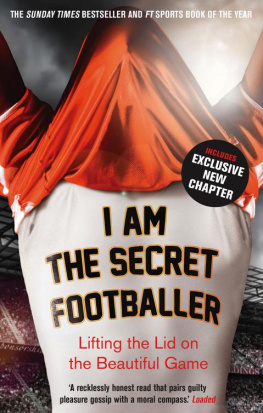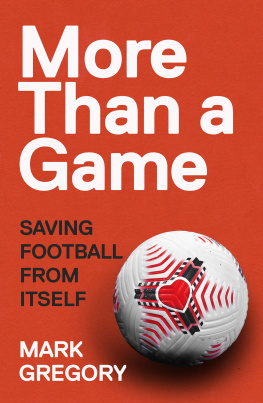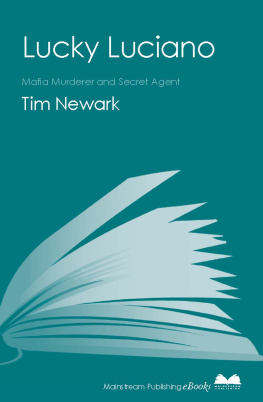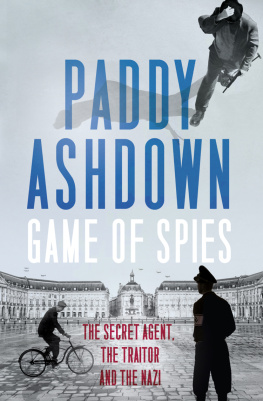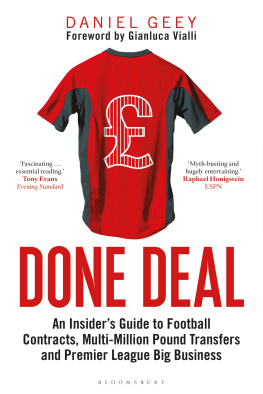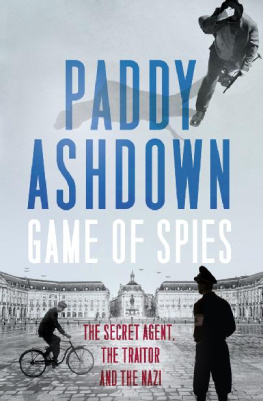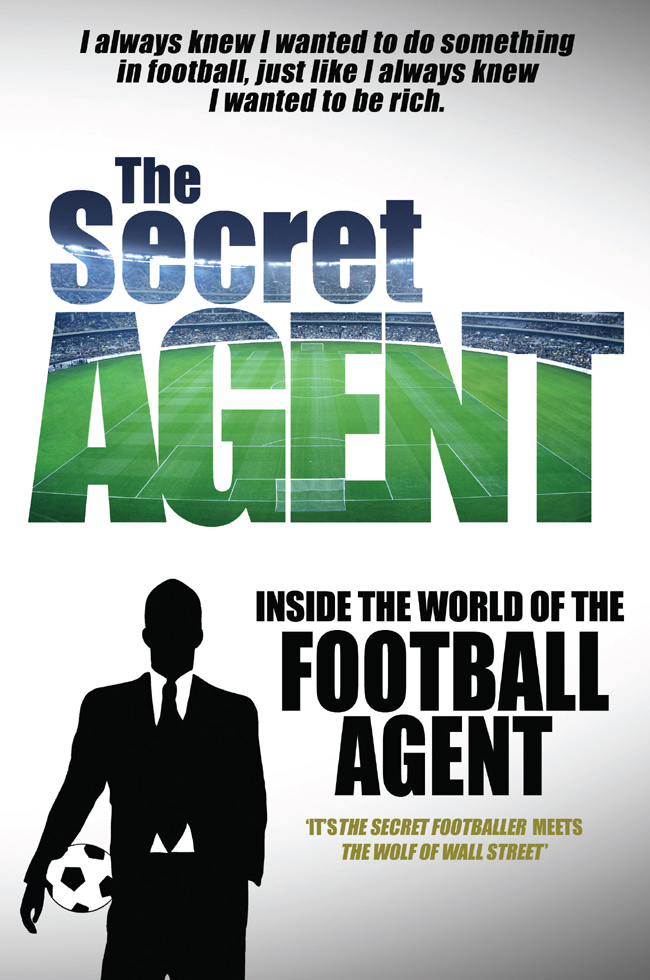THE SECRET AGENT
INSIDE THE WORLD OF THE FOOTBALL AGENT
First published in Great Britain in 2014 by
ARENA SPORT
An imprint of Birlinn Limited
West Newington House
10 Newington Road
Edinburgh
EH9 1QS
www.arenasportbooks.co.uk
Copyright The Secret Agent, 2014
ISBN: 978-1-909715-24-0
eBook ISBN: 978-0-85790-815-5
The right of The Secret Agent to be identified as the author of this work has been asserted by him in accordance with the Copyright, Designs and Patents Act 1988.
All rights reserved. No part of this publication may be reproduced, stored, or transmitted in any form, or by any means electronic, mechanical or photocopying, recording or otherwise, without the express written permission of the publisher.
Every effort has been made to trace copyright holders and obtain their permission for the use of copyright material. The publisher apologises for any errors or omissions and would be grateful if notified of any corrections that should be incorporated in future reprints or editions of this book.
British Library Cataloguing-in-Publication Data
A catalogue record for this book is available on request from the British Library.
Designed and typeset by Polaris Publishing, Edinburgh
Printed and bound by Gutenberg Press, Malta
CONTENTS

PROLOGUE
I ALWAYS KNEW I wanted to do something in football, just like I always knew I wanted to be rich. The trouble was that, as a kid, I was pretty crap on the pitch, and when you come from an East London council estate with parents who both have to work for a living, then the odds are really stacked against you.
So, ruling out being the next David Beckham, or buying my own club, that left me with fairly limited choices. I was great with stats. But Jeff Stelling had the prime job in that area all tied up, and not being blonde, female and with great tits, I couldnt see a future for myself on Sky Sports. I thought about coaching, but that was a long and rocky road, and I knew that not having played the game at the highest level, or any level at all when it came to that (other than my school class second XI and given that there were only twenty boys in my class that was no real achievement), I was at some disadvantage from the start.
But then I watched a programme that changed my life. Or at least made me make a life-changing decision. It was one of those fly-on-the-wall documentaries that was meant to uncover the dirt and corruption that lay beneath the world of football agents. You know the sort of thing, paying bungs to managers to make a deal happen, fitting up a rival to steal a player, lying through their teeth to parents to get the first run on looking after little Tommy and, worst of all (at least as far as the programme makers were concerned), making serious money.
Now, I know that to most people that would be a turn-off. Who wants to be a part of what seemed to be one of the most reviled groups of operators in the world? I was going to call it a profession, but clearly nobody on screen (apart from the agents protesting their innocence after having been caught fairly red-handed) actually used that word to describe the trade they plied. Yet, at twenty years of age, in my final year of a degree in media studies (well, I had to pick something or else face going out to work straight from school) it seemed more of an opportunity than a turn-off.
The main thing that the agents on show had in common, apart from greed and duplicity, was stupidity. They had all the contacts in the world (well, two of them were ex-pros so they ought to have) but they didnt have a brain cell between them. The fact that theyd all fallen for the TV networks sting proved it. So that was when I decided that I could do better than them.
It was an odd decision for me to make. Id never done anything dishonest in my life, and in a way it felt like suddenly deciding to embark on a life of crime. I was never going to be one for armed robbery or even Bernie Madoff-type fraud (although I confess to having had a sneaking admiration for Bernie which was balanced by disappointment when he got caught), but the opportunity for taking on what seemed to be nothing other than a career for chancers did appeal to me. It didnt seem to be very different from what bankers and share dealers were doing, and a lot more fun.
There were drawbacks to my plan. I didnt know any footballers personally, although I knew an awful lot about them from my obsessive compilation of profiles and statistics of every single player in the UK, and I dont just mean the international stars either. I had them all nailed down: from the English Premier League to the Football Conference, and taking in all the Scottish divisions on the way. Its amazing what you can pull together using the internet coupled with the sports papers not to mention good old YouTube, Twitter and Facebook.
My first decision was to create a fairly inventive CV. I wasnt really looking for paid employment at one of the big accountancy or law firms, so I reckoned I was pretty safe from a close inspection and I was certain Id impress if I could only get in front of somebody for an interview. That, in itself, was much harder than I thought it would be.
Every agent in England has to register with the Football Association (FA) who provide a list online of what they call Authorised Licensed Agents. I spent a whole day trawling through the names. Some Id heard of through the media, some were part of the big agencies and others were clearly just one-man bands operating from their front rooms. It hadnt occurred to me up to that point that Id need to pass an exam to pursue my chosen career, but there were details of the next FA Agents Exam posted on the website together with how to get the details of the syllabus. Id never had any problem in passing exams so that was no obstacle either, but again, at that point, I didnt have a clue as to how hard the authorities made it. There were a lot of things I didnt have a clue about then, but over the next five years I unravelled them all, and more.
As I wrote my letters of application or fired off emails where I could, I felt this enormous sense of excitement. I could do this, I knew it. And Id be good at it, of that I was certain. I just needed somebody to give me a chance.
GETTING STARTED
I T WAS MUCH harder than I thought. I wrote to all the mega agencies like WMG, Stellar, SEM, First Artist and James Grant, and although for the most part I got polite letters back saying they had no vacancies at the moment but wishing me luck for the future, I never got a sniff of an interview.
The breakthrough came when one of the guys, whose name Id read about often in the paper, actually replied to my email and offered to meet me for a coffee. If I thought I was about to be invited to one of Londons exclusive members clubs then I was disappointed because the venue was a Starbucks not far from Oxford Circus.
I recognised him immediately. I knew he was over fifty, but he looked a good ten years younger. Smart casual clothing, hair impeccably groomed, dark glasses even though it was January and we were meeting indoors. That was one of my first lessons. The right image was important. If you were meeting a young player for the first time, there was no point in turning up in a suit and a shirt with a collar and a tie. He had to be able to gauge the value of what you were wearing to be able to decide if you were cool and sharp enough to represent him. Players are judged by their agents. They talk about them in the dressing room as if theyre trophies.


